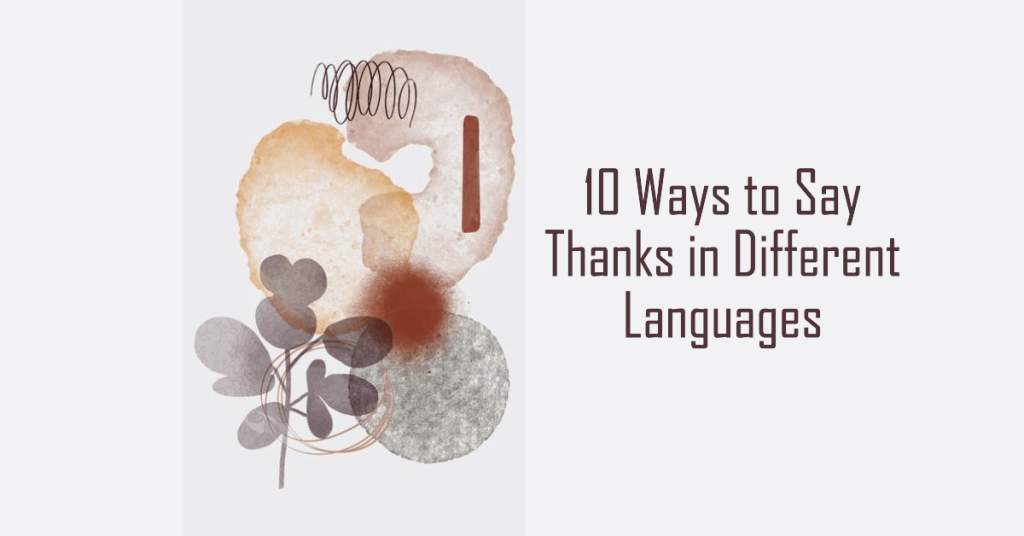10 Ways to Say Thanks in Different Languages
I want to share something that always warms my heart—gratitude. I remember a trip to Spain where a local helped me find my way when I was hopelessly lost.
I expressed my thanks by saying “gracias,” and the smile on their face made me realise how powerful those simple words can be.
It was a beautiful moment, reminding me that saying “thank you” isn’t just polite; it’s a way to connect with others, no matter where they come from.
Importance of Saying Thanks
Expressing gratitude is vital in building relationships. It’s like a bridge that connects different cultures and backgrounds.
Did you know that in some cultures, saying thank you can be as important as the act itself?
In Japan, for instance, expressing gratitude is not just about the words; it’s about the respect and humility behind them.
Gratitude is universal—a small phrase can have a massive impact, making someone feel appreciated and valued.
Now, let’s dive into how to say “thank you” in ten different languages. Each one comes with its unique cultural flavour!
1. Spanish: "Gracias"
In Spanish-speaking countries, “gracias” is more than just a word; it’s a heartfelt expression of appreciation. You’ll hear it everywhere—from casual conversations to formal settings. It’s often accompanied by a warm smile, reflecting the friendly nature of Spanish culture.
2. French: "Merci"
Ah, the elegance of French! “Merci” rolls off the tongue beautifully and is often used in daily interactions. In France, politeness is key, and saying “merci” shows respect and gratitude. You might even hear it whispered softly in quaint cafés after receiving your coffee.
3. Japanese: "Arigatou" (or "Arigatou gozaimasu")
Japanese culture places a strong emphasis on respect, and expressing gratitude is no exception. “Arigatou” is the casual form, while “arigatou gozaimasu” is more formal. Using these phrases shows not just appreciation but also an understanding of social hierarchy.
4. German: "Danke"
“Danke” is straightforward yet powerful in German-speaking regions. This simple word can open doors and foster connections. Germans value honesty and directness, so a genuine “danke” after receiving help or service can go a long way.
5. Italian: "Grazie"
When you say “grazie,” you’re tapping into the warmth and hospitality that Italy is known for. Italians often express their gratitude with passion, making it feel like a celebration of kindness rather than just a polite response.
6. Mandarin Chinese: "Xièxiè"
In Chinese culture, expressing gratitude carries significant weight. “Xièxiè” is not only a way to say thank you but also reflects a deep-rooted appreciation for relationships. Using this phrase can enhance social interactions and strengthen bonds.
7. Hindi: "Dhanyavaad"
In India, gratitude is woven into the fabric of many traditions. “Dhanyavaad” expresses sincere thanks and is often used in both formal and informal situations. The cultural context behind it highlights respect for others, making it an essential part of Indian etiquette.
8. Korean: "감사합니다" (Gamsahamnida)
Korean culture values politeness and respect deeply. “Gamsahamnida” embodies this spirit perfectly. It’s used in various situations, from everyday encounters to more formal settings, showing appreciation for kindness received.
9. Arabic: "شكرًا" (Shukran)
In Arabic-speaking countries, saying “shukran” carries beauty and significance. It’s not just about politeness; it’s about acknowledging the effort someone has made for you. This word is often used with warmth, reflecting the hospitality found in many Arabic cultures.
10. Malay: "Terima kasih"
“Terima kasih” showcases the sense of community prevalent in Malay-speaking regions. It signifies gratitude towards others while fostering connections within the community. Using this phrase can create a warm atmosphere wherever you go.
Saying Thanks in Different Languages
So there you have it—ten wonderful ways to express gratitude across different cultures! I encourage you to sprinkle these phrases into your everyday life. Whether you’re travelling or simply connecting with someone online, a heartfelt “thank you” can truly brighten someone’s day.
Have you learned any phrases of gratitude during your travels? Or do you have a personal favourite way to say thanks? I’d love to hear your stories! Share your experiences in the comments below—let’s spread the joy of gratitude together!
Q1: Can I use these thanks greetings when traveling to these countries?
Absolutely! Using local greetings shows respect for the culture and can help you connect with locals during your travels.
Q2: Are there any specific gestures associated with these thanks greetings?
While verbal greetings are sufficient, some cultures may have additional hand gestures or bowing customs to accompany the greetings.
Q3: Are these thanks greetings used in formal or informal settings?
The greetings mentioned can be used in both formal and informal settings, but it’s always good to observe the context and adjust accordingly.
Q4: What if I mispronounce the thanks greetings?
Don’t worry! Locals will appreciate your effort to learn their language. They will understand that pronunciation may take time to perfect.




